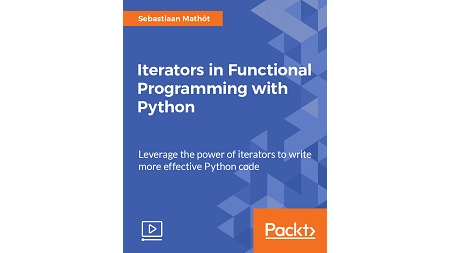
English | MP4 | AVC 1920×1080 | AAC 44KHz 2ch | 3h 02m | 798 MB
Get a thorough understanding of iterators (a crucial part of every Python programmer’s toolbox) to solve many real-world problems more efficiently.
Functional programming is a style of programming that is characterized by short functions and little reliance on variables. You will learn what functional programming is, and how you can apply functional programming in Python.
In this volume, you will learn everything there is to know about iterators in Python and how crucial they are in functional programming, where they are used, among other things, to implement repetitive logic and coroutines. You will learn about all standard iterators and iterator functions that Python offers. You will also learn to implement your own iterators. Functional programming makes heavy use of iterators, and we will learn how you can use them in functional programming through an interactive calculator application. All videos in the course contains simple, hands-on examples to give you a firm grasp on the subject.
At the end of this course, you apply the techniques that you’ve learned in this course in the real world with a final example (an interactive calculator application) but this time based on a sensible mix of programming techniques, including (but not limited to) functional programming.
What You Will Learn
- Understand what an iterator is in Python
- Learn the important role that iterators play in Functional Programming
- Iterators and iterator functions built into Python
- Create your own iterators
- Understand what a generator coroutine is
- Master list and dict comprehensions and generator expressions
Table of Contents
01 The Course Overview
02 Using a List – Mutable Sequences of Elements with a Fixed Order
03 Using a Tuple – Immutable Sequences of Elements with a Fixed Order
04 Using a Dict – Mutable, Key-value Mappings Without a Fixed Order
05 Using a Set – Immutable Collections of Unique Elements Without a Fixed Order
06 Unpacking Iterators by Assigning to Multiple Variables
07 What Is an Iterator
08 Creating Your Own Iterator
09 Exploring Generators
10 Lazy Evaluation
11 Coroutines – Implementing Concurrency through Generators
12 Convenience Iterators – The Collections Module
13 List Comprehensions
14 Dict Comprehensions
15 Generator Expressions
16 Nested Comprehensions
17 Using Convenience Functions
18 Using Numerical and Logical Functions
19 The Itertools Module
20 The Functools Module
21 A Functional, Iterator-Based, Interactive Calculator
22 Recognize the Most Suitable Programming Technique for the Job
23 A Sensible Interactive Calculator Built with Various Programming Techniques
Resolve the captcha to access the links!